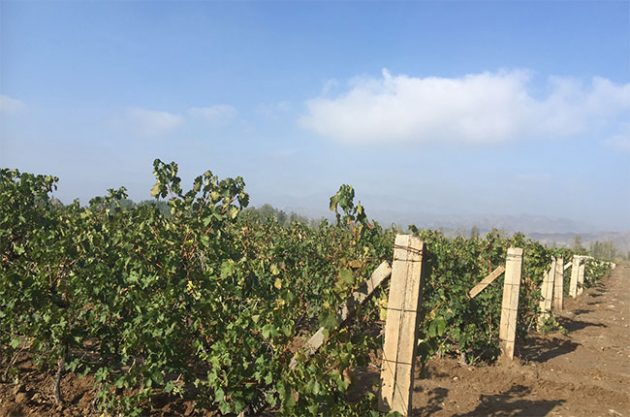
China: How the Ningxia 2017 harvest is looking
Wines from the 2017 harvest in China’s premier winemaking region look set to be fresher and slightly lower in alcohol than last year, but some white wine producers are rejoicing after avoiding the rot that damaged their 2016 crop. Sylvia Wu, editor of DecanterChina.com, reports from Ningxia on the harvest .
Ningxia 2017 harvest at a glance:
-
Early summer heat spike gives way to milder ripening period
-
Expect fresher wines with Cabernet alcohols around 1% lower than 2016
-
White wines free of rot but four or five days away from being perfect – Kaanan owner
Growing season

Vines at Silver Heights in 2017. This shows the typical single-cordon pruning method in Ningxia. Credit: Sylvia Wu
Rains during flowering season have led to comparatively loose fruit bunches than an average year, said ZHANG Jing, winemaker at Helan Qingxue winery at the foothills of the Helan Mountain East region.
‘During June and July, temperatures have been warmer than average, with rainfalls slightly below (average),’ said Mike Insley, operations manager and viticulture consultant at Pernod Ricard (Ningxia) winery.
Ningxia experienced a hot summer before veraison – the onset of ripening when the grapes change colour – with the highest temperatures hitting 40°C, said Lenz Moser, winemaker and consultant at Chateau Changyu Moser XV.
The leaves were ‘almost scorched’ before the end of July, said Emma Gao of Silver Heights, one of the highest Ningxia wineries situated more than 1,200 metres above sea level in the Helan Mountain East foothills.
Silver Heights kept more leaves on its vineyard canopies for shade and increased irrigation to ‘ease the thirst’ of the vines, she said.
Similar measures were taken at Pernod Ricard (Ningxia) winery to prevent the vines from the ‘heat spikes’, according to Insley.
‘The hot weather only lasted for two weeks with day temperature reaching 35-40°C and night temperature 22-23°C,’ he said, adding that the region’s diurnal temperature variation helped to ‘maintain a good balance’ in the grapes.
Ripening period

Chateau Mihope vineyards, some of the newest in Ningxia in 2017. Credit: Sylvia Wu
Soon after veraison, the temperature dropped to more mild levels, leading to a longer ripening period, said FAN Xi, chief engineer (winemaker) and deputy general manager of Chateau Changyu Moser XV.
At Silver Heights, Gao said the team conducted organic spraying after rains at the beginning of August to protect the grapes during ripening.
‘The leaves were slightly affected by rot, but the fruits were very healthy,’ Gao said.
The harvest

Sorting grapes during the 2017 harvest at Chateau Zhihui Yuanshi. Credit: Sylvia Wu.
Sparkling wine producer Domaine Chandon China, of LVMH group, finished harvesting its Pinot Noir and Chardonnay crop by mid-September, said chief winemaker LIU Aiguo.
Zhang Jing, Helan Qingxue, expects to make a ‘Chablis-like’ Chardonnay and saw the white harvest starting as early as 4 September. The Merlot harvest kicked off on 18th and Cabernet Sauvignon on 28th of the same month.
Though the winery attempted green harvesting on the red grape vines, ‘there were some pink berries’ at harvest, said Zhang Jing.
The sudden drop of temperature at the beginning of October forced the Kaanan Winery to finish picking before 8 October, said owner WANG Fang ( known affectionately as ‘Crazy Fang’).
‘Only if we had four to five more days—it would have been a perfect year.’
However, after losing the entire white crop to powdery mildew in 2016, Wang Fang said that it has harvested exceptionally healthy fruits this year. He said that he expected to produce a 2017 vintage its specialty white wine, a German-style Riesling.
For the Cabernet Sauvignon-led red wines, alcohol levels are expected to drop by 1% than 2016 to around 13%-14%, thanks to the moderate ripening period, said Fan Xi.
‘Although this is not a perfect year, the absence of disease means that it can be a fresh and pure vintage in the hands of careful winemakers,’ added Zhang Jing.
Most wineries expect to finish pruning and start burying the vines by early November so as to prevent the vines from the severe winter of Ningxia.
‘We are monitoring the temperature with our 36 temperature and soil moisture probes buried in our 68ha vineyards,’ said Liu Aiguo, ‘as soon as the temperature drops to zero, we will start burying the vines.’
Editing by Chris Mercer. Sylvia Wu was hosted in Ningxia by Chateau Changyu Moser XV and the Ningxia Wine Bureau.
